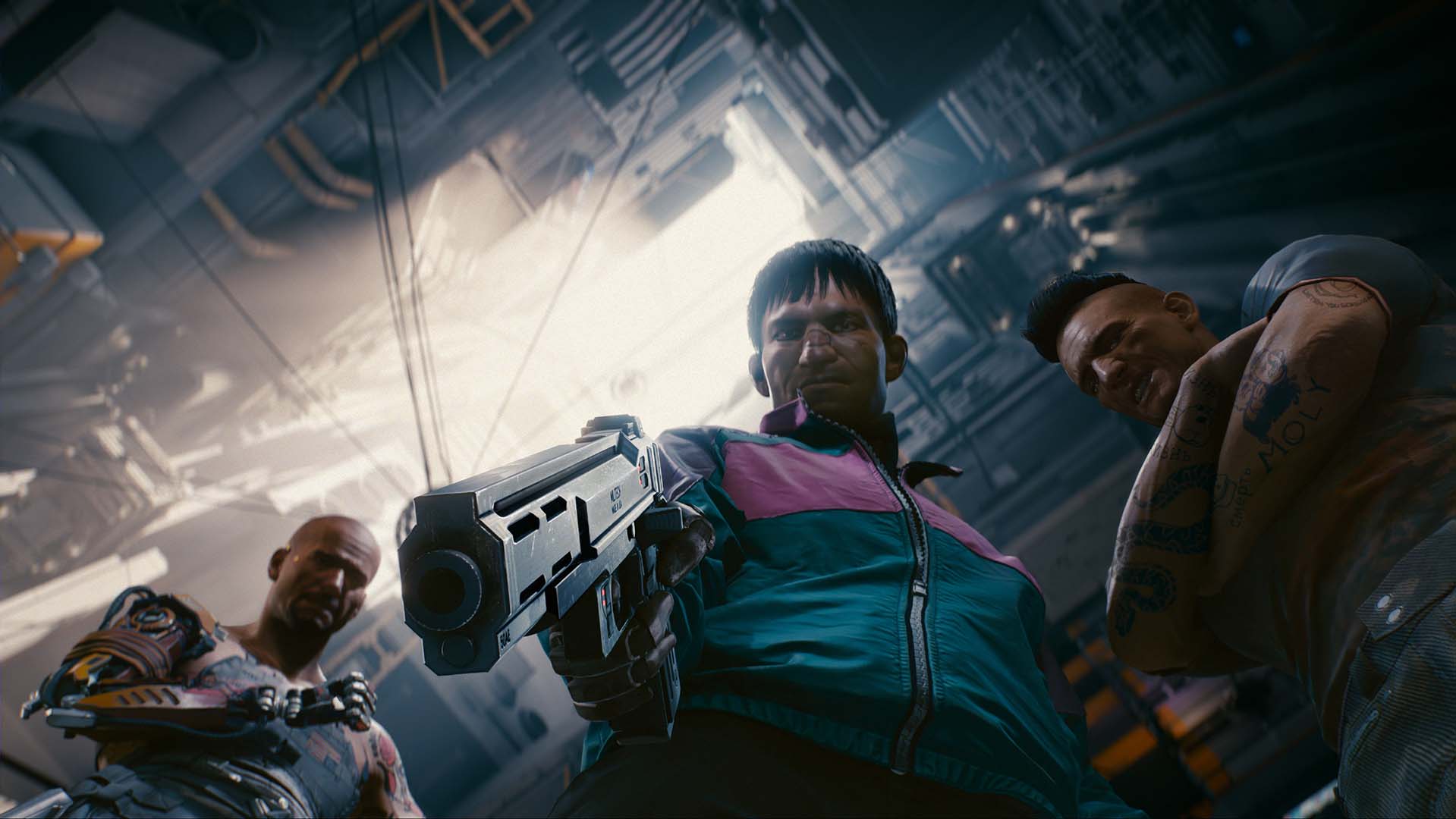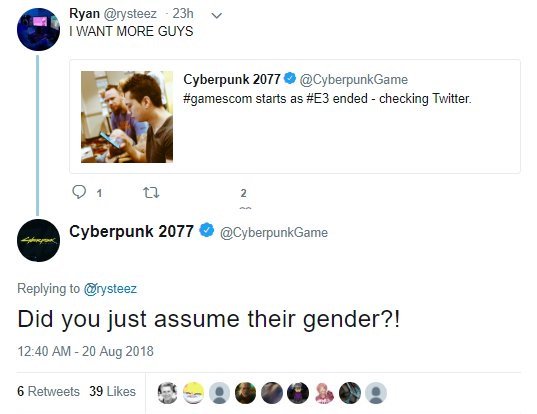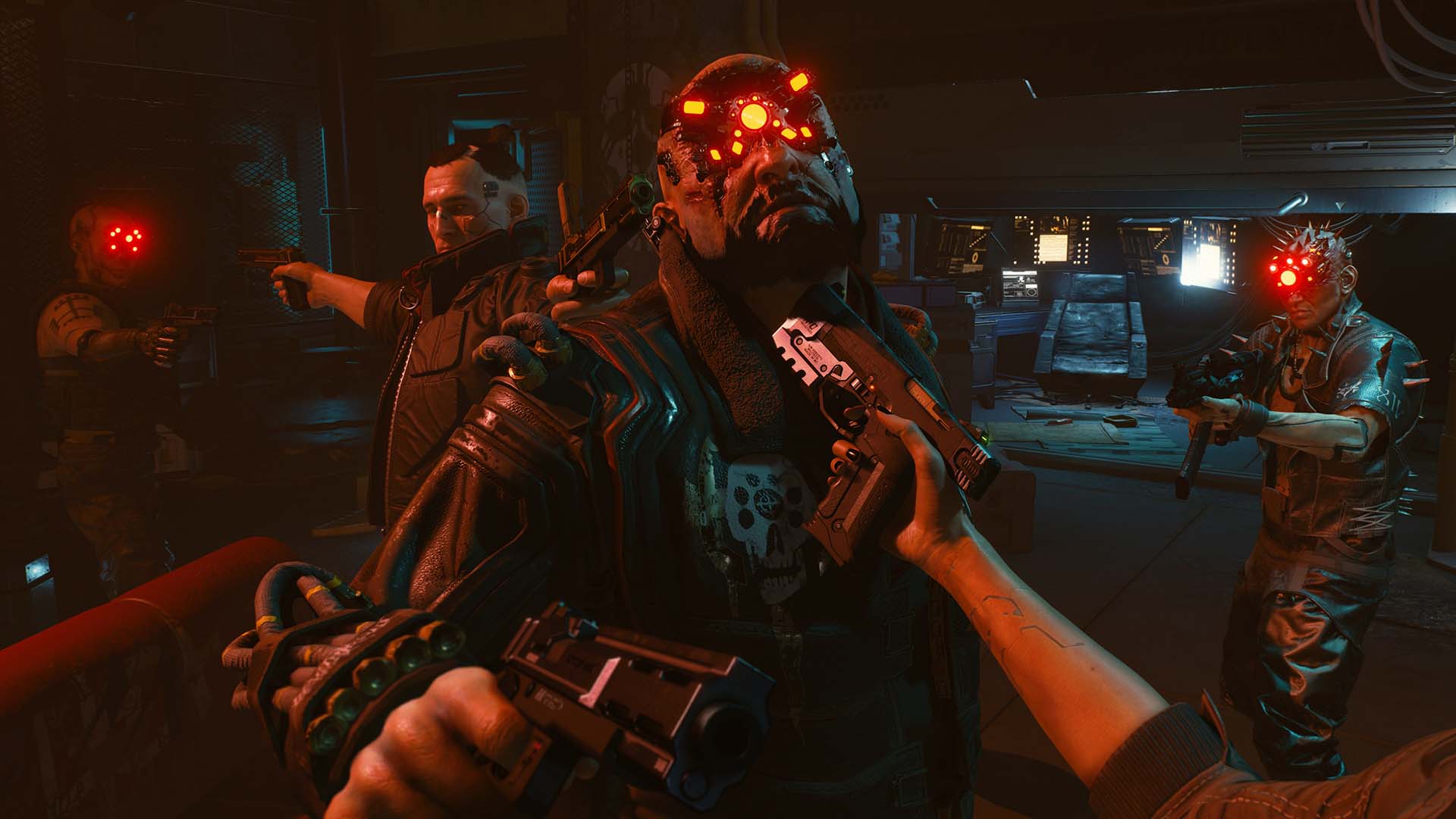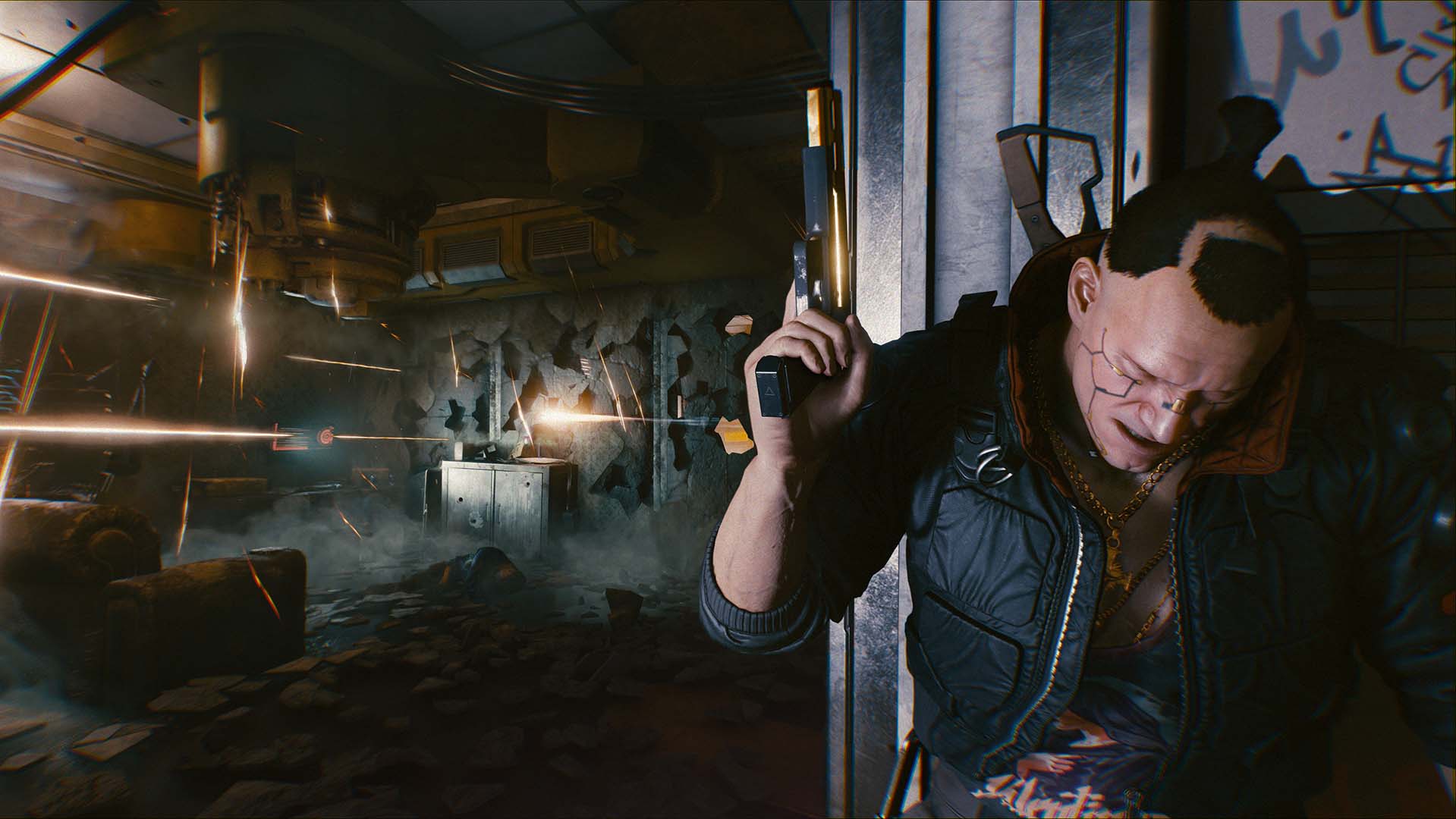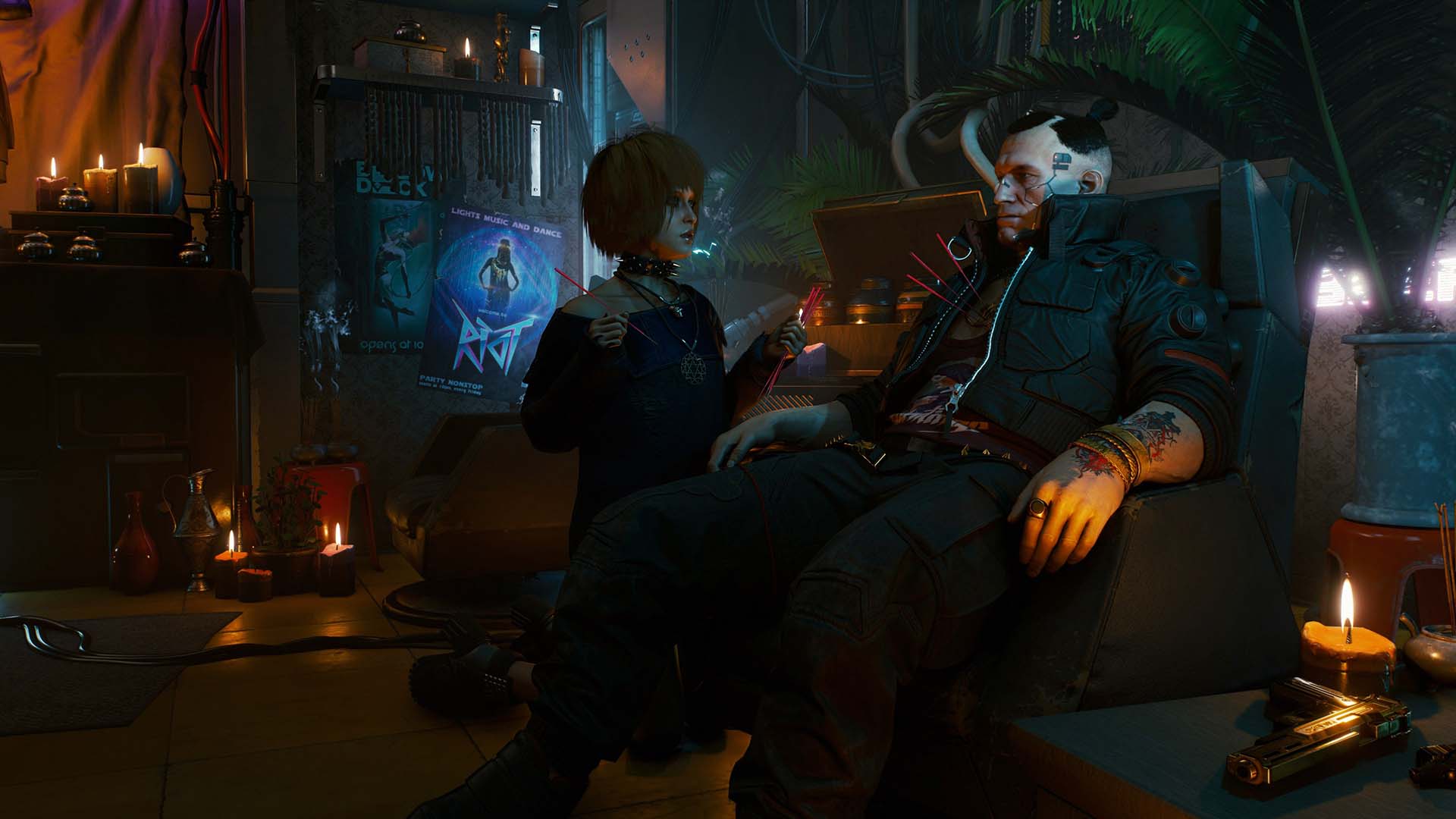This is an editorial piece. The views and opinions expressed in this article are those of the author and do not necessarily represent the views and opinions of, and should not be attributed to, Niche Gamer as an organization.
While the subject of the perpetually outraged joke police has been covered before numerous times and in numerous ways here on Niche Gamer, a recent surge of heavy policing focused on game developers has really gotten me concerned for the overall health of the gaming industry.
Now, a completely harmless joke derived from their upcoming game Cyberpunk 2077 made by presumably one of the social media managers at CD Projekt RED has gotten the ire of the outrage crowd.
You know, the armchair warriors that are seemingly, literally, always on social media screaming about something that offends them. Here’s the joke in question:
Notice how this joke is in no way directed at a specific person, it was a cute and silly response to a fan asking for more dudes in a game probably rife with dudes.
It didn’t take long for the moral arbiters of the internet to sniff actual comedy or humor, because they’re pretty clueless when it comes to jokes and humor in general.
Here’s a general idea of what the response was from *that* crowd, i.e. the insufferable holier-than-thou folks that act like some kind of gatekeepers for the gaming industry.
“Y’all heard how excited I was for Cyberpunk 2077 after seeing the demo. But all that good will keeps being chipped away because of shit like this. This doesn’t just ‘reflect poorly.’ This isn’t just about ‘alienating your consumers.’ It’s fucking gross, lazy, and dehumanizing,” said Austin Walker of Waypoint. “Do better,” he says.
Their joke tweet was quickly deleted, and CD Projekt quickly put out an apology, which reads: “Sorry to all those offended by one of the responses sent out from our account earlier. Harming anyone was never our intention.”
GOG, a branch of CD Projekt RED, has posted jokes before like a GIF of that infamous Postal 2 scene making fun of mainstream gaming journalism, only to find outrage and apologize then too.
There’s a massive problem with this type of response and following apology: These people are never satisfied and they will never stop their policing of differing opinions, and most especially controversial opinions or content.
I’ll go into some length regarding this for any game developers reading this or watching yet another similar scene like this unfold.
We as consumers and even critics of video games have a big influence over what video games are made, how they’re made, and what content said games have therein. The vast majority of these outrage police don’t actually play video games, nor do they actually care about video games.
We’ve seen time and time again how critics with these tendencies don’t actually play games they review.
In the age of let’s plays, longstreams, or what have you, mainstream gaming critics are typically journalism majors that didn’t make the cut for the Huffington Post. Video games to them are simply an easy way to get a podium, a megaphone, for them to scream through.
Game developers, please hear me out.
The vast majority of people that regularly purchase video games and regularly play said video games give zero shits about jokes poking fun at outrage police.
Most of us would think that joke is funny, and we would simply wonder how good the actual game is. That’s the real meat for us, how the actual game itself is – not the politics surrounding it.
We want you to have the freedom to make truly unique and ultimately fun games that we can purchase and enjoy.
The key word here is “fun,” and as fun is a very subjective thing, there are lots and lots of genres for you to play around with in making a product. Video games are products, something the fart-sniffing outrage police get furious being reminded of.
When a video game fails to be a fun or engaging product, it doesn’t sell well. This is probably the most basic concept of how the market economy works.
You provide a product or service that people want, and if your product or service is good, it will probably sell well. Armchair warrior game journalists and or outrage police don’t like this, nor do they agree with this.
We’ve seen politically-motivated games endlessly praised and pushed by the mainstream gaming press, and yet they tend to fail spectacularly and or sell very little.
Could it be that these self-proclaimed gatekeepers of the gaming industry have very little actual influence over typical buying habits? I think overall, that’s generally the case with the industry.
So, to reiterate, game developers – you should ultimately make the game(s) you want to make, but obviously – you should be trying to balance that with concepts you are pretty sure will be fun, and are more likely to sell well. We live in the digital age – it’s never been easier to self-publish a video game, get the word out, and build a community around it to help it sell well.
I’m speaking in pretty broad terms here and I naturally understand there’s a massive difference between hundreds of developers working on a giant, multi-million dollar game and those indie gems made by one or a few people. For all the “press X to awesome” games I see and forget about, there are more masterpieces like La-Mulana 2, a game made by three Japanese developers.
The issue here is naturally finding a middle ground, a balance, between the small game projects and dev teams and the massive, multi-continental dev teams made up of hundreds of developers.
Are there masterpiece AAA games? Of course. Ultimately, I want all game developers, going from the single indie dev to the giant multi-national teams, to have creative freedom.
Let’s circle around here. You’re probably wondering how I stand with censorship. I’ve written about censorship numerous times and generally, I’m one hundred percent against it.
However, we must remember that video games are products. If you make a product that the market rejects, that’s totally fine.
What isn’t fine are the games journalists trying to control narratives, force the acceptance of games that no one honestly cares about, or get people fired over tweets.
Ultimately, they want to shut down things deemed unacceptable by their cabal, things game developers say or things game developers create.
To put things into perspective, the outrage police are so horrendously triggered over the simple joke made above, a writer over at Kotaku is even questioning whether or not the social media manager behind the joke tweet should be employed, asking if they have a vetting process with their hires.
Once again, game developers – do not pay attention to these people.
These folks, the joke police of the internet, are the laughing stock of the gaming industry, whether they write for a gaming website or not. They are far from “influencers” to actually sell or not sell games, and you should just focus on making a “good” game that is ultimately “fun.”
